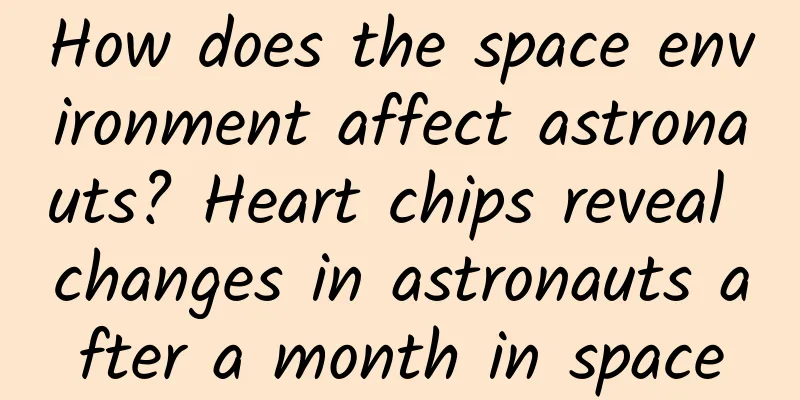How does the space environment affect astronauts? Heart chips reveal changes in astronauts after a month in space

|
Tuchong Creative Two astronauts from NASA were devastated. They had originally planned to go on a business trip for only 8 days, but due to problems such as a propeller failure and a helium leak, the 8 days turned into 8 months. However, the following news may make them even more upset. Recently, scientists have discovered that if astronauts stay in space for more than a month, their hearts will not only age, but also "beat out of sync." As we all know, the space environment is very complex, and radiation, weightlessness and other environments will affect the health of astronauts. How to more accurately study the impact of the space environment on the human body without "consuming" astronauts has always been a problem that scientists are troubled by. In order to study the impact of the space environment on the heart, scientists at Johns Hopkins School of Medicine came up with a "heart chip" solution. So, what is a “heart-on-a-chip” technology? Is it the same as a human heart? "Heart chip" is an in vitro experimental system that uses engineered heart tissue to simulate heart function and behavior in the human body. Specifically, the technology includes the following key steps: Creating heart tissue: Researchers first use human induced pluripotent stem cells (iPSCs) to differentiate them into cardiomyocytes. These cells are the main components of the heart and are responsible for the contraction and beating of the heart. During the tissue design process, the researchers strung these cardiomyocytes into 6 groups of samples between pairs of columns. One of each pair of columns is flexible and the other is hard, and magnets are embedded in the flexible columns. The second step is to contain the previously created heart tissue with a sealed chamber so that the liquid medium in which the tissue is cultured does not float in space. Finally, these chambers containing the tissue are loaded onto a culture plate, with magnetic sensors located underneath. Through the sensors, the researchers can collect information about the contraction of the heart tissue and detect whether the contraction strength of the heart tissue has weakened. Then, they installed the "heart chip" system in a chamber about half the size of a mobile phone. After the system was aboard the International Space Station with the sample tissue, the researchers could monitor the tissue contraction and the strength of the beating pattern in real time through sensors. Of course, for comparison, they also monitored a group of tissues that remained on Earth. The researchers found that the contraction strength of these tissues was almost halved after just 12 days on the International Space Station, and this weakening was still evident nine days after returning to Earth. The contraction strength of ground samples, on the other hand, was relatively stable. In addition, in space, as time goes by, the pulsation of tissues becomes more irregular. By the 19th day, the interval between each tissue pulsation increased by more than 5 times. However, this irregular pulsation disappeared after the tissue returned to Earth. Remember the two astronauts we mentioned at the beginning who are still floating in space at this moment? Their cardiovascular system may be under this kind of pressure. Now, staying in space for a long time not only makes their mental state unstable, but also their heart unstable. Fortunately, this situation should be alleviated after returning to Earth next year. Continuing with this experiment, after the tissues returned to Earth, the researchers used transmission electron microscopy to observe the sarcomeres of the tissues responsible for controlling muscle contraction and found that they became shorter and more disordered compared to the sarcomeres of the tissues that remained on the ground, which is a sign of heart disease in humans. In addition, the mitochondria in the tissues that stayed on the International Space Station for 30 days, which serve as energy factories, became larger and rounder and lost the characteristic folds that help cells use and generate energy. When the researchers sequenced RNA from tissue samples, they found increased expression of genes and pathways associated with inflammation and heart disease in tissues that had spent time on the ISS, again a hallmark of heart disease. This further suggests that heart cells experience severe stress or dysfunction in the space environment, which could lead to impaired energy production, which in turn leads to weaker heart cell contractility and decreased overall cellular health. In 2023, the researchers sent a second batch of 3D engineered heart tissue to the space station to screen for drugs that might protect cells from the effects of low gravity. So far, this research is still ongoing, and according to scientists, these drugs might help people maintain heart function as they age. Do you think the damage to your body from a long mission in space ends here? On February 4, 2024, 59-year-old Russian astronaut Oleg Kononenko broke the world record of another Russian astronaut Gennady Padalka, who had stayed in space for a total of 878 days, 11 hours, 29 minutes and 48 seconds, at 16:30:08 Beijing time, becoming the person with the longest cumulative stay in space. Both the United States and Russia have conducted extensive research on astronauts who stay in space for a long time. A report released by NASA shows that after entering space, the first challenge astronauts face is weightlessness, which causes blood and other body fluids to flow back into the chest and head, causing astronauts to experience facial edema, varicose veins in the neck, and nasopharyngeal obstruction. Generally speaking, such conditions are most obvious in the first few days after entering space, but if you see an astronaut using the "big head special effects", don't panic, because these conditions will gradually ease to a certain extent as the human body adapts to the weightless environment. Secondly, astronauts who stay in a weightless or microgravity environment for a long time will experience obvious muscle atrophy and bone calcium loss. Even if they have the strongest physique, it is difficult not to become "brittle" after staying in space for a long time. This is because the pressure on the load-bearing bones such as the leg bones and spine is suddenly reduced. At the same time, the stimulation to the bones is also weakened after the muscle movement is reduced, resulting in a large amount of bone decalcification and excretion through the kidneys. Recent studies have shown that strengthening exercise can alleviate these effects to a certain extent. Therefore, in order to avoid muscle atrophy, even on the International Space Station, astronauts must complete the daily training plan: running on the treadmill or doing other machine exercises for at least two hours a day. Sure enough, exercise should not only be practiced at home, but also practiced in space. The Russian astronaut Kononenko mentioned earlier said in an interview that in order to combat the effects of weightlessness on the body, he exercises regularly. In addition, Russian astronauts also take special medications. But even taking medications and exercising with strict self-discipline cannot completely solve these problems. A 2022 study by sports scientists at the University of Calgary in Canada showed that astronauts who lived in space for about six months could restore their previous bone strength a year after returning to Earth. Astronauts who lived in space for a longer period of time would experience permanent bone loss. Well, we are one step closer to becoming "permanently brittle workers." But in fact, the harm of space to the human body is far from over... The solar wind and cosmic rays in the space environment can also cause harm to the human body. According to a NASA research report, on the International Space Station at an altitude of 400 kilometers, astronauts are exposed to a radiation dose of more than 0.5 millisieverts per day. The radiation dose received in 12 days is equivalent to the radiation received by the crew of a passenger plane in a year. But fortunately, these radiation doses are not as harmful to the human body as we think. Remember what we said at the beginning? If you stay in space for more than one month, your heart will age and "beat out of sync". Although the impact of space on human aging is not good news for astronauts, the space environment is very useful in helping us understand the mechanisms related to aging. These effects can be observed in a very short time after astronauts are in microgravity. If we study animal aging models on Earth, it will take years or even decades to capture some changes that occur over time and aging effects. From Yuri Gagarin, the first hero in human history to enter space in 1961, who successfully flew into space on the "Vostok 1" spacecraft and circled the earth, saying "Earth, you are so beautiful". To Neil Armstrong, who stepped on the moon in 1969, saying "a small step for mankind", and then to Yang Liwei, the first Chinese man to fly into space, saying "I feel good"... They are undoubtedly great "hardcore players" of the universe, representing the courage and spirit of exploration of mankind, and have made outstanding contributions to the fields of science and technology, medicine, etc. Finally, we also hope that the two astronauts who are still forced to travel long distances in space, although they cannot stabilize their heartbeats, can try their best to stabilize their emotions and return to Earth safely, smoothly and on time. This article is a work supported by the Science Popularization China Creation Cultivation Program Author: Ma Ning Popular Science Author Reviewer: Zhou Binghong, Researcher, Ambassador of China Aerospace Science Popularization Produced by: China Association for Science and Technology Department of Science Popularization Producer: China Science and Technology Press Co., Ltd., Beijing Zhongke Xinghe Culture Media Co., Ltd. |
<<: "Water tiger" appears, this fish is very edible, has no friends and is still single...
Recommend
Growth hacking in action: a complete case study to explain the core operation methods
The concept of growth hacking has been very popul...
Volkswagen Financial Report: 9.24 million vehicles delivered in 2023, making a profit of 22.6 billion euros
Recently, Volkswagen released its fourth quarter ...
Detoxification will not only fail to cure the intestines but also cause black intestines, be careful with these things!
Chinese people are keen on "detoxification&q...
They are both potato chips, so why don’t we have to pay for “air” when buying potato chips in a bucket?
Reviewer: Wang Guoyi Postdoctoral fellow in Nutri...
Huawei's third-generation intelligent torque control system is first used in Avita
Judging from the current results, Huawei has buil...
Great! Completely noise-free Win10 PC is here
Windows 10 has been officially released for more ...
New media operation: the hard-core method to create millions of traffic for new accounts!
Hello everyone, I would like to share with you th...
China Merchants Bank APP User Incentive Program Report
With the diversification of finance today, bankin...
The college entrance examination papers were printed in prison? What happened? Revealed!
The annual college entrance examination kicked of...
From the perspective of user motivation and long-term value, analyze how to retain users?
This article analyzes how to retain users from th...
Introduction to Baidu search promotion broad matching method!
What is Broad Match With broad matching, when net...
How to operate an APP software online?
In general, app operations are divided into two a...
There were 144 space launches worldwide in 2021, with China ranking first, followed by the United States and Russia!
In 2021, global space travel was very busy, setti...
Graduation season: Cocos, a post-90s developer, talks about how to enter the industry and how to make progress
It's graduation season again. Are the young d...
Even G-Dragon couldn't save Beijing Hyundai? The domestic brands made a great contribution
How should we describe Beijing Hyundai's 2017...









